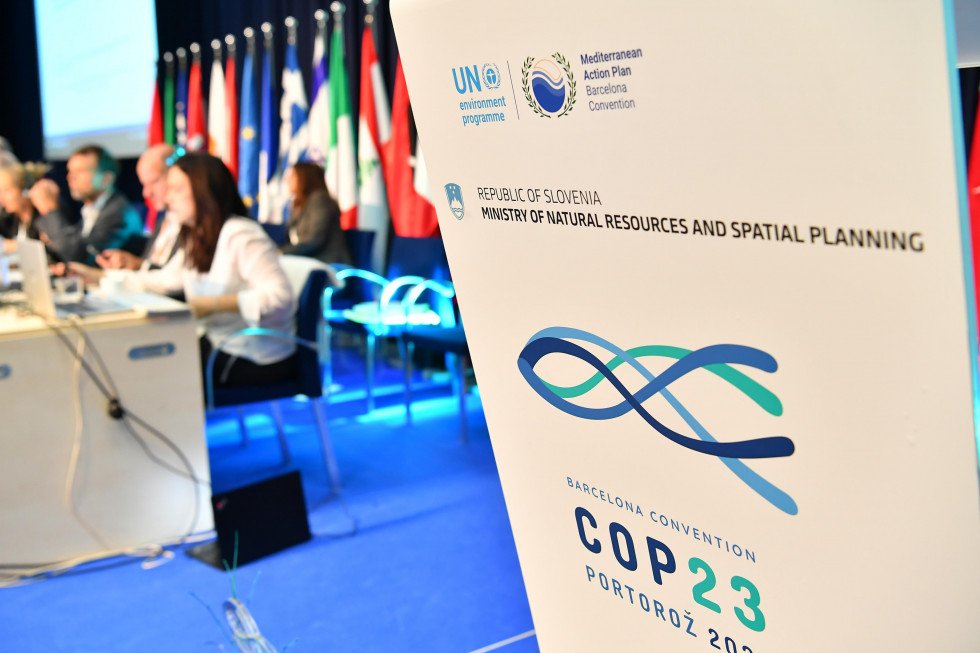COP 23: Successfully completed negotiations on the content of the Portorož Declaration

the 23rd meeting of member parties of the Barcelona Convention – Conference for Mediterranean Countries (COP 23) | Author Peter Irman
By adopting the Portorož Declaration, the countries commit to advocate measures for a faster green transition and investments in a water-, climate-, nutrition- and energy-friendly future. Slovenia has been leading the negotiations on the content of the Portorož Declaration, which have been evolving over the past weeks. The first two days of the meeting in Portorož involved an intensive finalization of the negotiations led on behalf of Slovenia by Dr Nataša Bratina, General Director of the Spatial Planning and Construction Directorate at the Ministry of Natural Resources and Spatial Planning. The declaration is expected to be adopted tomorrow afternoon at the ministerial part of the COP 23 meeting.
The adopted Declaration will present the framework of the work programme in the next two-year period when Slovenia presides over the Barcelona Convention.
The main highlights of the Portorož Declaration:
- Implementing the commitments of global agreements in the field of biodiversity, climate change and pollution management in the Mediterranean at a regional level.
- Promoting interregional and cross-border cooperation in the field of water and sea management based on the "source-to-sea" approach.
- Linking the management of river basins, coasts and seas, taking into account the ecosystem approach in the planning of water use and water sources.
- Adapting to climate change.
- Preventing pollution and waste formation (with a focus on plastic), in line with global and regional commitments.
- Active involvement of youth and promoting intergenerational cooperation.
Establishment of a new Regional Climate Change Centre
At the meeting, the member parties unanimously supported the idea of establishing a new Regional Climate Change Centre, which will be hosted by Turkey and is expected to start operating in 2025. This action is an important step at a regional level for the effective implementation of global commitments in the fight against climate change.
As the host of the Conference for Mediterranean Countries (COP 23), Slovenia takes pride in the fact that the intensive work at the Barcelona Convention in Portorož is contributing to a successful pursuit of the main slogan at the conference: "Green transition in the Mediterranean: from decisions to actions".
Side events
The side events simultaneously unfolding in today's meeting, as an open forum, along with representatives of non-governmental and professional-scientific organizations, opened up discussions of current content in the field of sea and coast protection upon increasing effects of climate change and water pollution.
Slovenia also actively participated in a side event on the topic of contemporary tools for promoting a sustainable blue economy in the Mediterranean and presented Slovenia's achievements in removing microplastics from aquatic environments, as well as modern technology for observing and monitoring dynamic processes in river basins, coasts and seas.
Lenča Humerca Šolar, from Slovenia's Ministry of Natural Resources and Spatial Planning, presented the field of Maritime Spatial Planning at a national level and Slovenia's Maritime Spatial Plan (MSP) – a strategic spatial development document. Slovenia's MSP was adopted in 2021 and sets goals and guidelines for further sustainable development of maritime activities and uses. Dr Andrej Kržan from Slovenia's Institute of Chemistry pointed out the issue of the increasing use of plastics/microplastics in everyday life, offering a solution by presenting special filters for washing machines that capture microfibers. Dr Tomaž Rodič from SPACE.SI (Slovenia's Centre of Excellence for Space Sciences and Technologies) presented the capacities of Slovenia's satellite designed to obtain data that can help minimise the consequences of natural disasters such as forest fires, floods and droughts in the future.
In the introduction, Dr Mitja Bricelj from Slovenia's Ministry of Natural Resources and Spatial Planning, and national coordinator of the Barcelona Convention, presented the importance of considering blue (rivers, seas) and green (coasts, forests) corridors in spatial planning. In the debate, the participants agreed that the future of a blue economy is based on the consideration of blue and green infrastructure – and that it's essential for local communities, science and young people to be included in the planning and decision-making processes.

